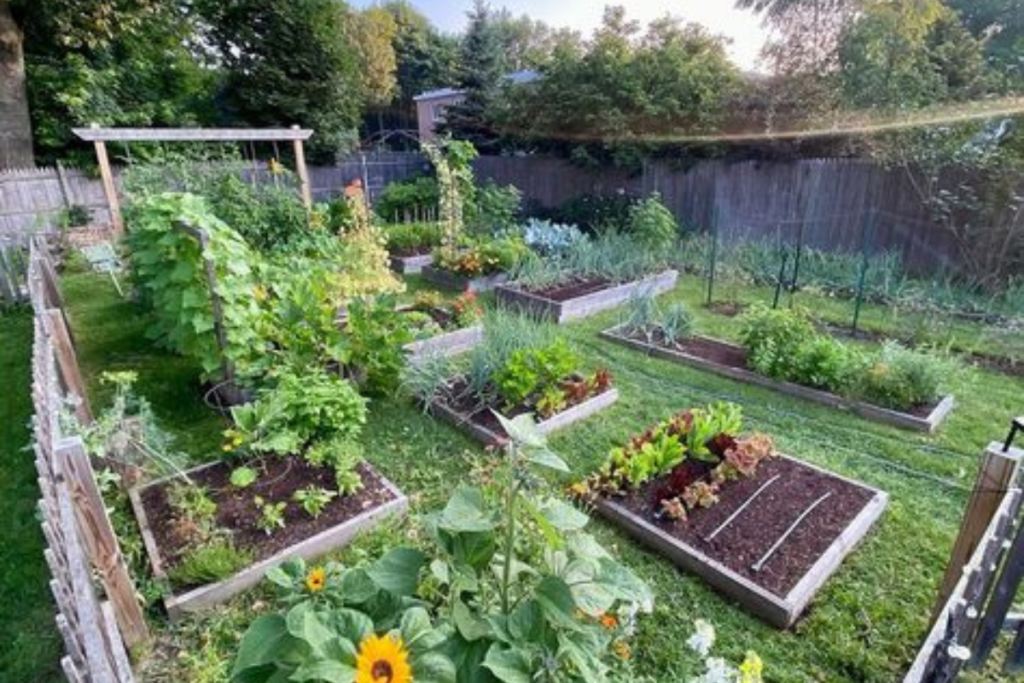Companion planting is a gardening technique that involves placing certain plants near each other to promote mutual benefits, such as improved growth, pest control, and overall plant health. This natural method takes advantage of the symbiotic relationships that can develop between plants when they are grown in proximity. Whether you are growing vegetables, flowers, or herbs, companion planting can enhance the productivity of your garden, reduce the need for chemical interventions, and create a healthier, more biodiverse environment. Here are some of the top benefits of companion planting in your garden:

1. Improved Pest Control
One of the most well-known benefits of companion planting is its ability to help control pests naturally. Certain plants can repel harmful insects or attract beneficial ones, reducing the need for chemical pesticides and promoting a healthier garden ecosystem.
- Natural Pest Repellents: Some plants naturally repel pests due to their strong scents or chemicals. For example, planting basil near tomatoes can deter mosquitoes, flies, and other pests that target tomatoes. Marigolds are often planted alongside vegetables to repel nematodes, aphids, and other harmful insects.
- Attracting Beneficial Insects: Certain companion plants attract pollinators like bees or beneficial insects like ladybugs, which help control aphids and other harmful bugs. For example, planting dill or fennel can attract predatory insects like ladybugs that feed on aphids, while sunflowers attract pollinators.
- Reducing Pest Damage: By planting pest-repellent companions next to vulnerable crops, you can significantly reduce the damage caused by common garden pests, allowing your plants to thrive without relying on harmful chemicals.
2. Enhanced Pollination
Companion planting can improve pollination, which is essential for the production of fruits, vegetables, and flowers. Some plants help attract pollinators such as bees, butterflies, and hummingbirds, which in turn benefit neighboring plants.
- Flowering Companions: Planting flowers that attract pollinators, such as lavender, marigolds, or zinnias, near your fruit or vegetable crops can boost pollination rates. Increased pollination leads to better fruit set and more abundant harvests.
- Variety of Pollinators: Different pollinators are attracted to different plants, so having a variety of flowering companions can help ensure that your plants are pollinated by a broad spectrum of beneficial insects.
3. Increased Plant Growth and Yield
Companion planting can enhance the growth and overall yield of your garden by improving soil conditions, providing shade, or offering natural support to neighboring plants. Some plants have specific benefits that can increase the overall health of your garden.
- Nitrogen Fixing: Certain plants, like legumes (beans, peas, clover), have the ability to fix nitrogen in the soil, making it more fertile for neighboring plants. When planted alongside nitrogen-hungry plants like tomatoes or corn, these legumes help improve soil fertility and boost plant growth.
- Shade and Shelter: Taller plants or those with broad leaves can offer shade or shelter to smaller, more delicate plants. For example, corn can provide shade for lettuce or spinach, preventing them from bolting in hot weather. Similarly, tall sunflowers can act as a natural windbreak for smaller plants.
- Mutual Support: Some plants, like beans, grow up poles or other plants, creating a natural support system that can reduce the need for stakes or trellises. Beans often grow well alongside corn, as the corn provides a sturdy structure for the beans to climb.
4. Natural Weed Control
Companion planting can help reduce weed growth by providing ground cover or creating a dense canopy of leaves. This reduces the amount of sunlight that reaches the soil, inhibiting the growth of weeds and decreasing the need for herbicides.
- Groundcovers: Low-growing plants like clover or creeping thyme can act as ground covers, blocking weeds from sprouting. These plants spread quickly and form dense mats that suffocate weeds, keeping the soil clear and healthy.
- Shade-Inducing Plants: Taller plants like corn, squash, or sunflowers can cast shade on the soil, preventing weeds from getting enough sunlight to grow. Squash, for example, has large leaves that can shade the ground, helping to suppress weed growth beneath it.
5. Improved Soil Health
Companion planting can improve soil health in several ways, such as by enhancing nutrient availability, increasing biodiversity, and preventing soil depletion. By growing different plant species together, you create a more balanced ecosystem that benefits the soil and the plants.
- Diverse Root Systems: Companion plants often have different root structures that penetrate the soil at various depths, allowing for better nutrient absorption and preventing soil compaction. For example, deep-rooted plants like carrots or beets can help break up compacted soil, while shallow-rooted plants like lettuce can improve soil aeration.
- Soil Enrichment: Certain plants, such as legumes, are nitrogen-fixing, which adds nitrogen to the soil and helps improve its fertility. When planted with other crops that require nitrogen, these plants reduce the need for synthetic fertilizers, making the garden more sustainable and eco-friendly.
6. Reduced Need for Chemical Inputs
By using companion planting, gardeners can reduce or eliminate the need for chemical fertilizers, pesticides, and herbicides. This makes the garden more environmentally friendly and can improve the quality of the produce, as it will be free from harmful chemicals.
- Pesticide-Free Gardens: Companion planting encourages natural pest control, reducing the need for chemical pesticides. For example, planting garlic near roses can repel aphids, while planting dill near cabbage can keep cabbage worms away.
- Natural Fertilization: Companion plants that fix nitrogen or enrich the soil naturally can reduce the need for chemical fertilizers, which can be harmful to the environment. For example, beans can help provide the nitrogen that other plants like corn or tomatoes need to grow.
- Eco-Friendly Weed Control: Companion planting helps manage weeds without the use of herbicides. By using ground covers, shade, and dense planting, weeds are naturally suppressed, which reduces the need for chemical weed killers.
7. Improved Plant Health and Disease Resistance
Certain plants have natural compounds that can help improve the overall health and disease resistance of their companions. Companion planting can help plants fight off diseases, prevent infections, and boost immunity.
- Disease Prevention: Some plants, such as basil, have natural compounds that repel harmful pathogens. For example, basil can protect tomatoes from diseases like fusarium wilt and tomato hornworm. Similarly, planting oregano near your vegetables can help prevent fungal infections.
- Increased Biodiversity: Companion planting encourages a diverse garden ecosystem, which can reduce the spread of disease. A variety of plants attracts beneficial insects and microorganisms that help keep harmful pests and diseases in check.
- Interplanting with Herbs: Many herbs, such as thyme, rosemary, and mint, have antimicrobial properties that can help keep harmful bacteria and fungi away from your garden, improving the overall health of your plants.
8. Maximized Space in Small Gardens
Companion planting is especially beneficial in smaller gardens, where space is limited. By carefully selecting plant combinations that support each other, you can maximize the space and increase your yields.
- Vertical Gardening: Taller plants can provide support for climbing plants, allowing you to grow more in the same area. For example, planting beans alongside corn or tomatoes allows the beans to climb the corn stalks, using vertical space efficiently.
- Intensive Planting: By planting complementary crops close together, you can create a more intensive planting system, which increases the amount of food you can grow in a smaller space. For instance, planting radishes between rows of carrots can make use of the soil while the carrots are still growing.
Conclusion
Companion planting is a highly beneficial practice that can help you achieve a healthier, more productive garden while minimizing the use of chemical inputs. By planting complementary species together, you can enhance pest control, improve pollination, increase yields, and maintain soil health. Whether you’re growing vegetables, herbs, or flowers, companion planting is an eco-friendly and sustainable way to support biodiversity and create a thriving garden. Experiment with different plant combinations and enjoy the rewards of a vibrant, bountiful garden.
